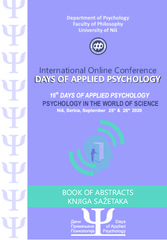Приказ основних података о документу
People with intellectual disabilities in higher education environment
| dc.creator | Glumbić, Nenad | |
| dc.creator | Brojčin, Branislav | |
| dc.creator | Đorđević, Mirjana | |
| dc.date.accessioned | 2021-06-17T14:07:02Z | |
| dc.date.available | 2021-06-17T14:07:02Z | |
| dc.date.issued | 2020 | |
| dc.identifier.isbn | 978-86-7379-541-6 | |
| dc.identifier.uri | http://rfasper.fasper.bg.ac.rs/handle/123456789/3263 | |
| dc.description.abstract | The literature on university education for people with disabilities almost exclusively refers to students with sensory impairments, motor difficulties or high-functioning autism. However, some universities, mostly in Italy, Spain and USA, offer specific education degree to people with intellectual disabilities (ID). The aim of this exploratory research was to determine whether university professors in Serbia already have experience with these students and what do they think about ad hoc university courses created for them. The research was done within the ERASMUS+ Project “Training university teachers for the inclusion of people with intellectual disabilities”. The convenience sample consisted of 160 university teachers coming from five Serbian universities, aged from 24 to 67 years (M = 43.84; SD= 9.32). They were asked to fill in a questionnaire on formative needs of university teachers teaching students with ID. Surprisingly, 18% stated they have taught to people with ID in higher education environment. The majority (70.4%) think it could be useful to establish an ad hoc university course for people with ID. On the contrary, some participants were extremely offended by the idea that people with ID could be enrolled in post-secondary education at the university level. Pearson’s chi-square test was used to determine differences between university teachers working in different scientific fields. No statistically significant difference regarding opinions on university courses for people with ID was observed between university professors teaching in faculties of social sciences, medicine and natural sciences (χ²(2) = 1.087, p > .05). It seems that inclusion of students with ID at universities in Serbia is already a reality, although there is no common framework that regulates this issue. | |
| dc.language | en | |
| dc.publisher | University of Niš, Faculty of Philosophy Department of Psychology | |
| dc.rights | openAccess | |
| dc.rights.uri | https://creativecommons.org/licenses/by-sa/4.0/ | |
| dc.source | 16th Days of Applied Psychology – Psychology in the World of Science: book of abstracts | |
| dc.source | BOOK OF ABSTRACTS NIŠ, SERBIA, SEPTEMBER 25TH & 26TH 2020. Niš, Serbia, | |
| dc.subject | intellectual disability | |
| dc.subject | higher education | |
| dc.subject | university teachers | |
| dc.title | People with intellectual disabilities in higher education environment | en |
| dc.type | conferenceObject | |
| dc.rights.license | BY-SA | |
| dc.citation.epage | 64 | |
| dc.citation.other | : 64-64 | |
| dc.citation.spage | 64 | |
| dc.description.other | 16th Days of Applied Psychology – Psychology in the World of Science | |
| dc.identifier.fulltext | http://rfasper.fasper.bg.ac.rs/bitstream/id/3716/Untitled1.pdf | |
| dc.identifier.rcub | https://hdl.handle.net/21.15107/rcub_rfasper_3263 | |
| dc.type.version | publishedVersion |


